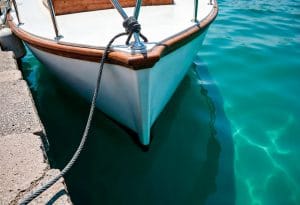The title of Yacht Captain is an important distinction and responsibility for those passionate about sailing and the sea. Obtaining this title requires meeting certain requirements and going through a rigorous training and evaluation process. In this article, we will explore in detail the requirements and powers of the title of Yacht Captain, providing you with all the information you need to understand this certification and continue on your path to becoming a marine expert.
In this previous article we talked about all the titles that exist for pleasure boats.
What is the Yacht Captain Title?
The Yacht Captain title is an internationally recognized certification that grants sailors the ability to steer pleasure vessels up to 24 meters in length. This distinction not only confers theoretical and practical knowledge about navigation, but also demonstrates a high level of skills and competence in the maritime field and broadens the powers of the Yacht Master and the powers of the PER.
Requirements to Obtain the Yacht Captain Title
To obtain the title of Yacht Captain, it is necessary to meet certain requirements established by the maritime authorities. These requirements may vary slightly from country to country, but in general, they include the following:
1. Minimum Age
To aspire to the title of Yacht Captain, you must meet the minimum age established by the maritime authorities. In most cases, this minimum age is 18 years, although it may vary depending on the maritime legislation of each country. The minimum age is verified by presenting an official identification document, such as a passport or ID card.
2. Medical Certificate
It is mandatory to present a medical certificate confirming that the applicant is in adequate physical and health conditions to perform the duties of a Yacht Captain. This medical certificate must be issued by a licensed medical professional and must include a complete evaluation of the applicant's physical and mental fitness. The purpose of this requirement is to ensure the safety of both the boater and the passengers on board the vessel.
3. Theoretical and Practical Training
It is necessary to complete a theoretical and practical training program approved by the maritime authorities. This program usually includes topics such as navigation, meteorology, maritime regulations, safety at sea, boat maneuvers and advanced navigation techniques. During practical training, candidates must gain experience in handling boats and face real situations at sea.
4. Official Exams
Once the theoretical and practical training is completed, a series of official exams must be passed to obtain the title of Yacht Captain. These exams evaluate the theoretical knowledge and practical skills of the applicant in various aspects of navigation, such as coastal navigation, navigation techniques, meteorology, maritime regulations, safety at sea, among others.
The qualifying exam to obtain the title of Yacht Captain consists of 40 multiple choice questions with 4 options each. This exam must be completed in a maximum of 2 and a half hours.
5. Previous qualifications required
To obtain the title of Yacht Captain you must previously have the titles of:
- Recreational Boat Skipper (PER): This title allows you to govern motorized pleasure boats up to 15 meters in length, which do not go more than 12 miles from the coast. In addition, you can also navigate between islands within the Balearic and Canary archipelago.
- Yacht Skipper: This title allows you to govern motorized pleasure boats up to 24 meters in length that do not travel more than 150 miles from the coast. It also allows navigation between islands within the Balearic and Canary archipelago, and navigation between the peninsula and the islands.
After obtaining these two titles, you would be able to obtain the title of Yacht Captain, which allows you to govern motorized pleasure boats without limits on length or distance from the coast.
Are you interested in: Obtain the title of Yacht Captain
What are the responsibilities of the title of Yacht Captain?
Once the title of Yacht Captain is obtained, a series of powers and responsibilities are acquired that allow the navigator to play a leadership role on board recreational vessels. Below are some of the main attributions associated with this title:
Governing Motorized Pleasure Boats
The Yacht Captain has the ability to assume command and responsibility of recreational vessels of up to 24 meters in length. This includes planning and executing the navigation route, controlling the vessel during the voyage and making decisions in unforeseen situations.
Navigation Distance
The Yacht Captain has the ability to sail greater distances compared to other lesser nautical titles. You can venture on longer voyages and explore larger sailing areas, both in coastal waters and offshore. This title authorizes navigation without geographical limits.
Day and Night Navigation
The Yacht Captain has the ability to carry out both day and night navigation. This involves the ability to navigate during the day, in full visibility, as well as at night, using appropriate orientation techniques and lighting systems. This assignment demonstrates advanced knowledge in terms of navigation and night safety, including the use of navigation lights, maritime charts and specific guidance techniques for low visibility situations.
New professional powers
The title of Yacht Captain grants powers that were previously exclusive to the obtain STCW95 certification. Now, a Yacht Captain can perform the following activities:
- Take tourist excursions with up to 6 passengers: This title allows you to govern pleasure boats for tourist activities, taking up to six passengers on board in addition to the crew.
- Go on recreational fishing trips: As a Yacht Captain, you can also carry out recreational fishing trips, always respecting local and international fishing regulations.
- Transfer vessels between ports: You can transfer boats between different ports, a task in high demand by boat rental companies or by individuals who need to move their boats.
- Manage lifeguard boats on beaches: This title qualifies you to govern boats intended for lifeguarding and security on beaches and coastal areas.
- Transport supplies to other vessels: If a vessel needs supplies on the high seas, as a Yacht Captain you would be qualified to carry out this task.
- Do sea trials with boats and jet skis: This degree also allows you to perform sea trials, which are essential for evaluating the condition and performance of boats and jet skis.
What knowledge will a yacht captain have?
The title of yacht captain is the highest title that can be achieved to govern pleasure vessels. After obtaining this title, your skills give you an important role on any vessel at sea.
Crew and Passenger Safety
One of the fundamental roles of the Yacht Captain is to guarantee the safety of all occupants of the vessel. This involves taking the necessary precautions before setting sail, carrying out safety inspections on board, monitoring compliance with maritime safety regulations and being prepared to respond to emergencies and risk situations.
Navigation and Orientation
The Yacht Captain has a deep knowledge of navigation and orientation techniques. You can use navigation instruments, interpret maritime charts, calculate courses and distances, and use global positioning systems (GPS) to plot an accurate and safe route.
Meteorology and Sea Conditions
To ensure safe navigation, the Yacht Captain must be familiar with weather forecasts and understand how weather conditions can affect navigation. This involves evaluating the strength and direction of the wind, sea currents, tides and other factors that may influence the journey.
Maintenance and Operation of the Vessel
The Yacht Captain must have basic knowledge of the maintenance and operation of the vessel. This includes supervision of navigation equipment, electrical systems, communication systems, engines and propulsion systems, as well as knowledge of onboard safety measures and resource management.
Maritime Rules and Regulations
The Yacht Captain must be aware of the maritime regulations and regulations in force in the area where he navigates. This involves knowing and complying with navigation rules, maritime signals, safety regulations, environmental restrictions and any other legal provisions that affect navigation.
First Aid and Rescue at Sea
As the person in charge on board, the Yacht Captain must have basic knowledge of first aid and rescue techniques at sea. Being prepared to provide emergency medical care and coordinate rescue actions in the event of accidents or dangerous situations is crucial for the safety of crew and passengers.
Aquatic bikes
The Yacht Captain has the ability to govern jet skis, within the specific navigation limits applicable to these vessels. This means that, in addition to commanding larger pleasure boats, you can also enjoy driving jet skis, as long as you comply with the regulations and restrictions established for their safe use. Jet skis provide an agile and exciting navigation experience, allowing the Yacht Captain to explore coastal areas and access places that are difficult to access for larger vessels.




